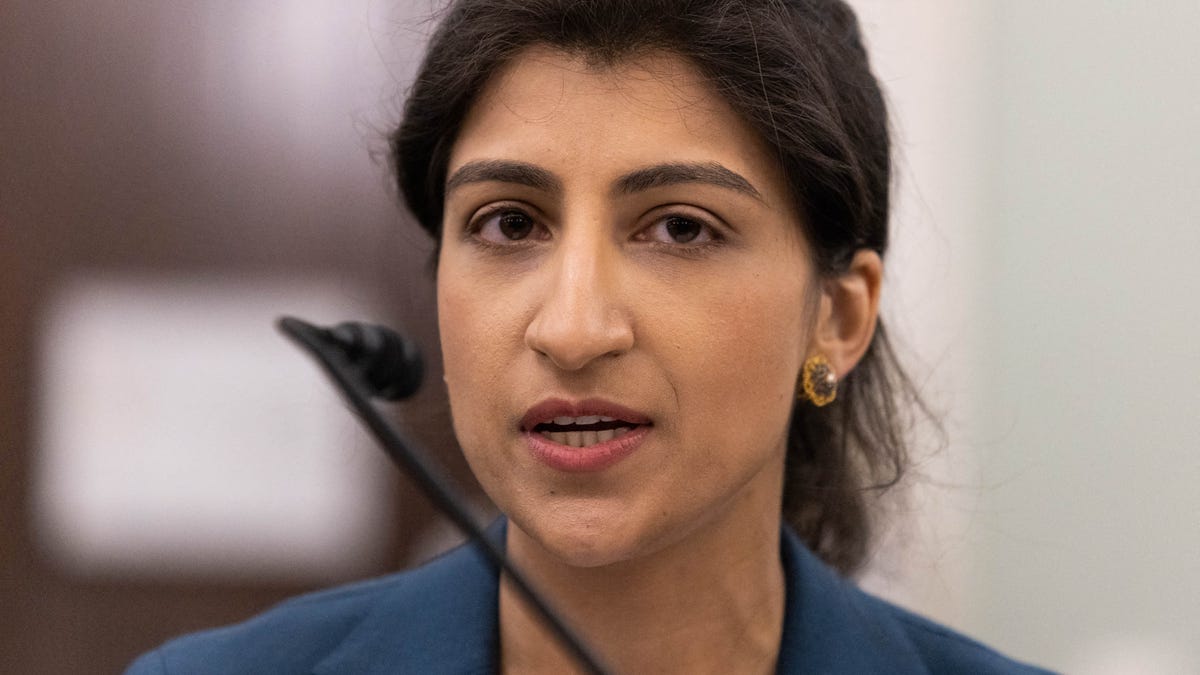FTC Chair Lina Khan outlines antitrust priorities
The new FTC chair's approach could target Big Tech giants.

FTC Chair Lina Khan testifies at her Senate confirmation hearing on Capitol Hill in April 2021.
US Federal Trade Commission Chair Lina Khan outlined her vision and policy priorities in enforcing antitrust in a memo issued to staff on Wednesday.
The memo offers an early glimpse into how Khan plans to lead the five-member agency that's tasked with enforcing consumer protections. The new direction of the FTC under Khan's leadership could have big implications for large tech firms, like Amazon, Apple, Facebook, Google and Microsoft, which have come under more scrutiny by regulators and lawmakers, who say their power should be reined in. The FTC enforces antitrust law along with the Department of Justice as it seeks to protect consumers against unfair business practices and privacy violations.
In the memo, Khan outlined several strategic principles. These include taking a "holistic approach to identifying harms." Khan said she wants the FTC to take into consideration that in addition to consumers, those who can be harmed by antitrust violations include workers and other businesses. This is a shift from the popular view of antitrust enforcement that focuses solely on consumer harms.
She also suggested "targeting root causes rather than looking at one-off effects" when it comes to analyzing mergers. She said it's important to assess how business models or conflicts of interest may result in antitrust harms. Among other key principles, she said the agency needs to be "forward-looking" and to act more quickly to mitigate harm. This includes paying close attention to "next-generation technologies, innovations, and nascent industries across sectors."
Khan outlined three specific policy priorities:
- Addressing "rampant consolidation." Khan said it's important to focus resources and scrutiny on dominant firms, where a lack of competition makes unlawful conduct more likely. This will include revising merger guidelines in conjunction with the DOJ to deter mergers that the agency and DOJ are likely to challenge.
- Going after "dominant intermediaries" or "gatekeepers." Khan wrote, "Business models that centralize control and profits while outsourcing risk, liability, and costs also warrant particular scrutiny, given that deeply asymmetric relationships between the controlling firm and dependent entities can be ripe for abuse."
- Taking aim at contracts that set up unfair methods of competition or deceptive practices. Khan mentioned noncompete clauses, exclusionary clauses and repair restrictions as being harmful to consumers and other businesses negotiating over terms and conditions.
Khan also said the FTC should broaden its skillset and hire more technologists, financial analysts and other experts from different fields so that it's able to build on existing talent to take an interdisciplinary approach to its analysis of markets.
Khan's memo comes three months after she was confirmed by the Senate. Progressives cheered her pick as chair and have been hopeful that the antitrust reformer would bring fresh eyes to an agency that's largely been viewed as ineffective in reining in the power of Big Tech giants.
As an academic, Khan gained notoriety as leader of a movement calling for more-rigorous antitrust enforcement. Her approach outlined in her 2017 Yale Law Journal article titled "Amazon's Antitrust Paradox" argues that an antitrust framework focused on consumer welfare has been inadequate in preventing harms from big dominant technology firms, like Amazon.
Prior to Khan's appointment, the FTC had started to get tougher on the nation's most prominent tech companies. Last year, the commission sued Facebook, alleging that the social media company violated antitrust law. The FTC has asked the court to overturn Facebook's deals to buy photo sharing app Instagram and instant messaging app WhatsApp. Both those deals had been reviewed by the FTC.

